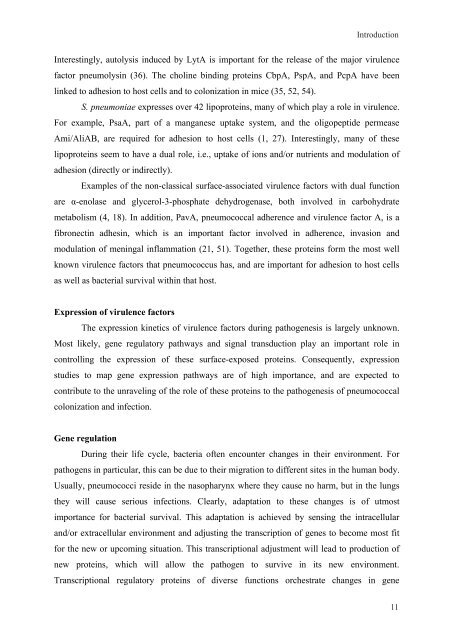Gene regulation in Streptococcus pneumoniae - RePub - Erasmus ...
Gene regulation in Streptococcus pneumoniae - RePub - Erasmus ...
Gene regulation in Streptococcus pneumoniae - RePub - Erasmus ...
You also want an ePaper? Increase the reach of your titles
YUMPU automatically turns print PDFs into web optimized ePapers that Google loves.
Interest<strong>in</strong>gly, autolysis <strong>in</strong>duced by LytA is important for the release of the major virulence<br />
factor pneumolys<strong>in</strong> (36). The chol<strong>in</strong>e b<strong>in</strong>d<strong>in</strong>g prote<strong>in</strong>s CbpA, PspA, and PcpA have been<br />
l<strong>in</strong>ked to adhesion to host cells and to colonization <strong>in</strong> mice (35, 52, 54).<br />
Introduction<br />
S. <strong>pneumoniae</strong> expresses over 42 lipoprote<strong>in</strong>s, many of which play a role <strong>in</strong> virulence.<br />
For example, PsaA, part of a manganese uptake system, and the oligopeptide permease<br />
Ami/AliAB, are required for adhesion to host cells (1, 27). Interest<strong>in</strong>gly, many of these<br />
lipoprote<strong>in</strong>s seem to have a dual role, i.e., uptake of ions and/or nutrients and modulation of<br />
adhesion (directly or <strong>in</strong>directly).<br />
Examples of the non-classical surface-associated virulence factors with dual function<br />
are α-enolase and glycerol-3-phosphate dehydrogenase, both <strong>in</strong>volved <strong>in</strong> carbohydrate<br />
metabolism (4, 18). In addition, PavA, pneumococcal adherence and virulence factor A, is a<br />
fibronect<strong>in</strong> adhes<strong>in</strong>, which is an important factor <strong>in</strong>volved <strong>in</strong> adherence, <strong>in</strong>vasion and<br />
modulation of men<strong>in</strong>gal <strong>in</strong>flammation (21, 51). Together, these prote<strong>in</strong>s form the most well<br />
known virulence factors that pneumococcus has, and are important for adhesion to host cells<br />
as well as bacterial survival with<strong>in</strong> that host.<br />
Expression of virulence factors<br />
The expression k<strong>in</strong>etics of virulence factors dur<strong>in</strong>g pathogenesis is largely unknown.<br />
Most likely, gene regulatory pathways and signal transduction play an important role <strong>in</strong><br />
controll<strong>in</strong>g the expression of these surface-exposed prote<strong>in</strong>s. Consequently, expression<br />
studies to map gene expression pathways are of high importance, and are expected to<br />
contribute to the unravel<strong>in</strong>g of the role of these prote<strong>in</strong>s to the pathogenesis of pneumococcal<br />
colonization and <strong>in</strong>fection.<br />
<strong>Gene</strong> <strong>regulation</strong><br />
Dur<strong>in</strong>g their life cycle, bacteria often encounter changes <strong>in</strong> their environment. For<br />
pathogens <strong>in</strong> particular, this can be due to their migration to different sites <strong>in</strong> the human body.<br />
Usually, pneumococci reside <strong>in</strong> the nasopharynx where they cause no harm, but <strong>in</strong> the lungs<br />
they will cause serious <strong>in</strong>fections. Clearly, adaptation to these changes is of utmost<br />
importance for bacterial survival. This adaptation is achieved by sens<strong>in</strong>g the <strong>in</strong>tracellular<br />
and/or extracellular environment and adjust<strong>in</strong>g the transcription of genes to become most fit<br />
for the new or upcom<strong>in</strong>g situation. This transcriptional adjustment will lead to production of<br />
new prote<strong>in</strong>s, which will allow the pathogen to survive <strong>in</strong> its new environment.<br />
Transcriptional regulatory prote<strong>in</strong>s of diverse functions orchestrate changes <strong>in</strong> gene<br />
11<br />
11

















